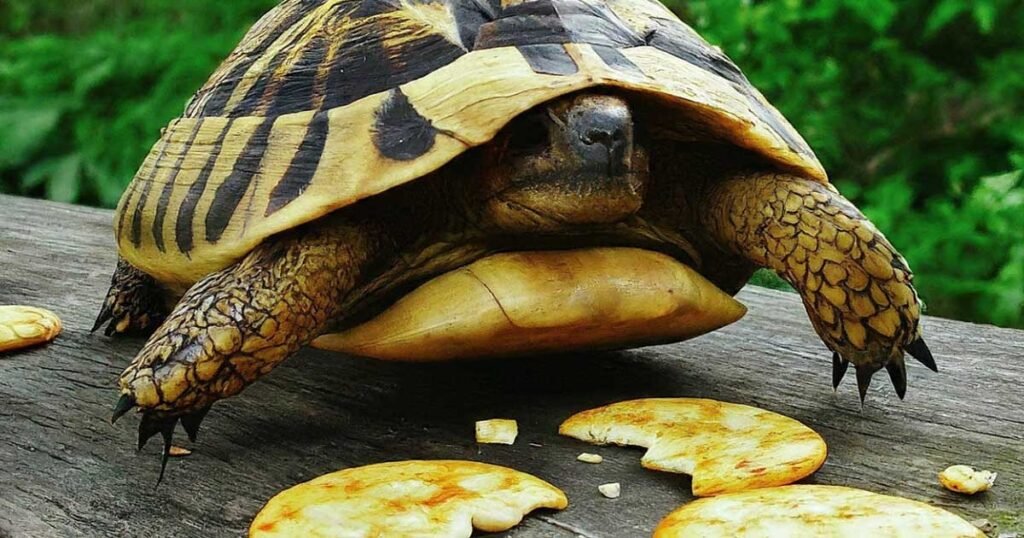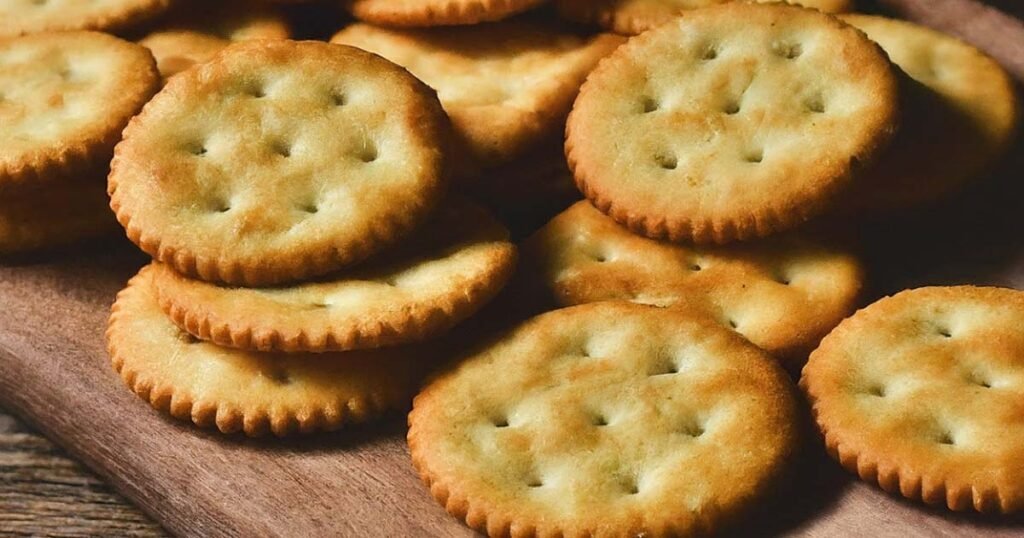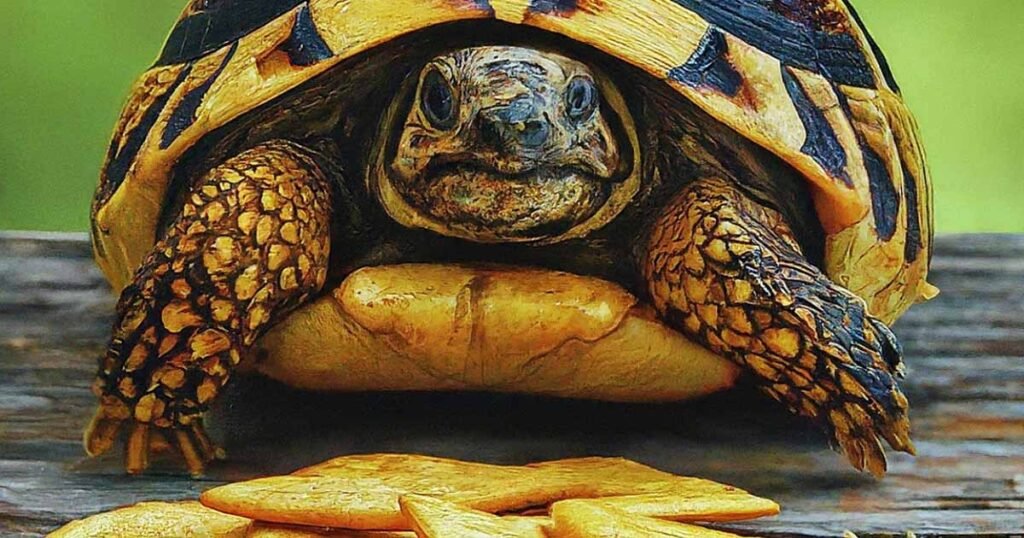In the human diet, crackers are a regular crunchy snack. If you are a new pet turtle owner, you may think about feeding many delicious foods you eat. But can turtles eat crackers like us? Even if they can, crackers are not a safe diet for turtles. For omnivore turtles, the best diet is balanced, including vegetables, fruits, and meat meals.
Crackers-type meals are generally not recommended for turtles. Turtle owners must make an ideal meal plan to keep them healthy. However, depending on turtle species and age, their diets can vary. In this post, we will clarify this question: Can turtles eat crackers? If not, why and what are the risks of feeding crackers to a turtle?
Can Turtles Eat Crackers?

It’s not recommended to feed crackers to turtles as it can cause health issues. But they can eat crackers. This food offers zero to no nutrition for turtles. Crackers contain oil, salt, sugar, or preservatives, which are not suitable for turtles.
However, you can feed whole-grain crackers occasionally that are free of additives, oil, too much sugar, or salt. Crackers can make your turtles sick if they eat them frequently.
Downsides of Feeding Crackers Frequently to Turtles

Sharing a snack with your shelled friend can be tempting, but crackers are a definite no-no – especially those with high sugar, monosodium glutamate, and preservatives. Even though crackers might seem harmless, they can pose several health risks to turtles. Here’s why:
Nutritional Deficiency
Crackers are often filled with refined flour and added sugars, containing low protein and calcium. These are essential nutrients for a healthy turtle. Protein is the building block of a turtle’s body, necessary for muscle growth, immune system function, and energy production.
Calcium is vital for strong bones and a healthy shell, a turtle’s natural armor. A diet lacking in protein and calcium can have serious consequences.
- Muscle Weakness: Without sufficient protein, your turtle’s muscles may become weak and underdeveloped. It can impact their ability to swim efficiently, dig for food, or even right themselves if they get flipped over.
- Brittle Bones and Shell Problems: A lack of calcium can lead to Metabolic Bone Disease (MBD) in turtles. This debilitating condition weakens bones and softens the shell, making them susceptible to fractures and deformities. MBD can also cause lethargy and pain in your turtle.
Digestive Distress
A turtle’s digestive system is designed to handle a diet rich in fiber and moisture found in plants and insects. Crackers are typically high in starch and low in fiber, which can cause problems for your turtle’s digestive system:
- Constipation and Impaction: Crackers don’t have enough fiber to help your turtle pass stool, and this can lead to constipation and impaction. Impaction is a severe condition where waste material lodges in the digestive tract, causing pain, discomfort, and potentially death.
- Bloating and Discomfort: Regular cracker meals might make your turtle feel bloated and uncomfortable, which affects their appetite.
Dehydration
Crackers are dry and often high in salt. It can dehydrate your turtle, especially if they don’t have access to fresh water readily available. Dehydration can lead to a variety of health problems, including:
- Dry, Sunken Eyes and Lethargy: Dehydrated turtles may exhibit dry, sunken eyes and a lack of energy.
- Electrolyte Imbalance: Dehydration affects your turtle’s electrolyte balance, which is essential to muscle function and nerve transmission. Electrolyte imbalances can lead to muscle weakness, seizures, and even death.
Choking danger
Depending on the size of your turtle and the cracker, it can be a choking hazard. Small pieces of cracker can become lodged in your turtle’s throat, causing them to struggle to breathe.
Note: Not all of the above-stated risks can only happen after your turtle eats crackers. A very occasional treat of crackers will not do any significant harm to turtles. Crackers are only applicable in these cases when you don’t serve a balanced meal with veggies, fruits, and meats.
When you serve a suitable variety of meals, you don’t have to worry about these health risks – even if you feed crackers sparingly.
Are there Any Types of Crackers that Turtles Can Eat?

If you want to feed your turtle crackers, you can do so. We already mentioned that whole-grain crackers made with oats, wheat, or any other healthy ingredients are comparatively safe for turtles. Crackers made from whole grains can boost your turtle’s health.
Saltine crackers and unsalted soda crackers are okay for turtles in very small amounts. However, your turtle should avoid high sugar, salt, extra spice, extra flavors, or preservatives, including crackers. Make sure you check the ingredients before you buy crackers.
How to Feed Crackers to Turtles Occasionally?
Crackers can be like sprinkles on ice cream – a fun little extra, but not the whole meal. Healthy and robust turtles need a balanced diet packed with nutrients. They just don’t get enough good stuff from crackers.
You can give your turtle a special surprise by crumbling up a plain cracker and sprinkling it over their food. This will be like confetti added to their mealtime adventure. Remember, you should only keep these treats occasionally, not every day.
Healthy Crackers Alternatives for Turtles
Looking for ways to spoil your turtle without harming them? Here are some great options:
- Fresh Fruits and Vegetables: Chopped fruits like apples, berries, vegetables, or leafy greens provide a delicious and nutritious boost.
- Live Food: Mealworms, crickets, earthworms, small fish, or meat contain protein and nutrition packs for your turtle.
- Commercial Treats: There are a lot of commercial turtle treats that are healthy and safe. So, you can include a specialized pellet for your turtle’s meal plan.
FAQs
Can turtles eat goldfish crackers?
If offered, your shelled friend might take a bite but skip the goldfish crackers. Those crackers are high in salt and carbs, which is not the kind of fuel your turtle needs. Eating the same food all the time – you wouldn’t want to do that, would you?
Like us, turtles love new, tasty food when it is outside their regular diet. However, keep them on their regular diet of veggies, fruits, and protein-rich foods.
Can box turtles eat crackers?
Even if box turtles can eat crackers, they should not. Crackers are not a healthy option for any turtle species. They are high in salt, preservatives, and sometimes sugar, all of which are bad for turtles’ health if served in large amounts.
Turtles need a varied diet consisting of vegetables, fruits, bugs, fish, or meat.
Read More: Can Turtles Eat Cherries?
Bottom Line
It’s best to leave them out of the cracker’s snack bowl. While a tiny piece of a plain cracker might be okay on a very rare occasion (think a once or twice-a-month treat!), It’s not something that is a regular habit.
Your shelled friend will be much happier with a diet full of healthy options that keep them energized and growing. You can spoil your turtle with chopped fruits and veggies or special turtle treats formulated just for them. These options are way better than crackers.
